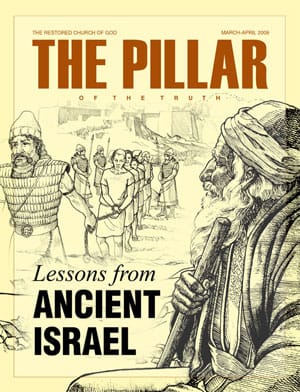During the Passover service, breaking of unleavened bread is a time to reflect on the great sacrifice of our Creator. This symbol of Jesus’ broken body has a specific purpose, separate from that of the wine symbol. It is through the broken body of Jesus Christ that we can be healed of our physical sins.
The apostle Paul wrote, “All have sinned, and come short of the glory of God” (Rom. 3:23). Chapter 6, verse 23 states, “The wages of sin is death.” The wages of physical sin include sickness and disease. Violating physical laws can result in illness, even death.
How is one released from the penalty of physical
sin?
While most traditional Christians never fully understand Christ’s sacrifice is for our spiritual sins—and what it means—they do generally know Christ died for us (Col. 1:13-16; Eph. 3:9). His shed blood paid the penalty for broken spiritual laws.
However, most are unaware that there is physical
sin—never mind that it needs to be forgiven.
Matthew 9, Mark 2 and Luke 5 all contain parallel accounts of Christ healing “a man sick of the palsy, lying on a bed” (Matt. 9:2). Continuing in Luke, this account states, “And when He saw their faith, He said unto him, Man, your sins are forgiven you” (Luke 5:20).
Consider what these accounts are saying. Telling someone he is healed (“Rise up and walk”) and forgiving his sin (“Your sins be forgiven you”) are equivalent.
Jesus Christ willingly paid the penalty for every physical mistake human beings will make. Every condition, pain, suffering, disease, illness, injury, infirmity—and even death itself—is covered within Christ’s promise.
Chapters 52 and 53 of Isaiah record an astonishing prophecy describing Christ’s suffering prior to His crucifixion on the stake. Examining the prophecy reveals the event at which Christ bore our infirmities and sicknesses. The description concludes with the following picture of the fulfillment of His role: “Surely He has borne our griefs, and carried our sorrows: yet we did esteem Him stricken, smitten of God, and afflicted. But He was wounded for our transgressions, He was bruised for our iniquities: the chastisement of our peace was upon Him; and with His stripes we are healed” (53:4-5).
A New Testament passage summarizes the above account. I Peter 2:22-24 speaks of Christ, “Who did no sin, neither was guile found in His mouth…who His own self bore our sins…by whose stripes you were healed.”
Pause for a moment. Reflect on what Jesus was willing to endure on behalf of those who need God’s marvelous healing power—such a horrific beating so that human beings could be restored back to perfect health, so we can “prosper and be in health” (III John 2)—and enjoy the “abundant” life (John 10:10).
I Corinthians 5:7 states, “Christ our passover is sacrificed for us.”
Each year, on the night of the Passover, Christians are commanded to assemble for a solemn memorial service, which looks back at Christ’s suffering and crucifixion. The service is unlike any other occasion in the year.
Paul explains the symbols of the Passover service and summarizes all we have covered: “And when He had given thanks, He broke it, and said, Take, eat: This is My body, which is broken for you: This do in remembrance of Me.
“After the same manner also He took the cup, when He had supped, saying, This cup is the new testament in My blood: This do you, as often as you drink it, in remembrance of Me.
“For as often as you eat this bread, and [two separate symbols] drink this cup, you do show the Lord’s death till He come. Wherefore whosoever shall eat this bread, and drink this cup [both] of the Lord, unworthily, shall be guilty of the body and blood [both] of the Lord.
“But let a man examine himself, and so let him eat of that bread, and drink of that cup. For he that eats and drinks unworthily, eats and drinks damnation [judgment] to himself, not discerning the Lord’s body.
“For this cause many are weak and sickly among you, and many sleep [have died]” (I Cor. 11:23-30).
As we approach Passover, remember that God wants us to understand the forgiveness of all sins—both physical and spiritual.
















